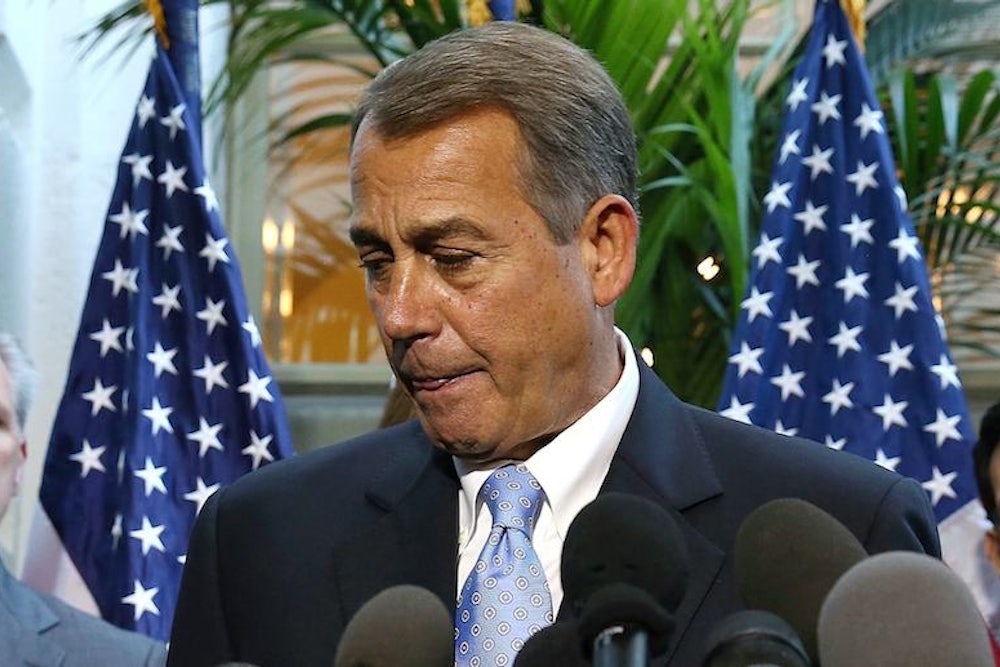On Monday I wrote that the shutdown/default-threat/Republican extortion plot was essentially over—it was just a matter of Harry Reid and his Republican counterpart, Mitch McConnell, hammering out the final details of a deal whose contours were coming into focus. Once they’d reached a deal, it would pass the Senate with a fair amount of bipartisan support. After which John Boehner would tearfully bring it to the floor of the House in defiance of the so-called Hastert Rule (requiring a majority of House Republicans to support a bill before it can come to a vote), possibly with some minor face-saving alteration that the Senate signaled it could accept.
Regrettably, I was wrong. As it happens, Reid and McConnell came very close to inking a deal Monday night, but then McConnell suspended their negotiations on Tuesday to give Boehner a chance at passing a bill, which promptly collapsed under the weight of his own ineptitude and your basic garden-variety House Republican lunacy, at which point Reid and McConnell resumed their negotiation over a deal that will soon pass the Senate and force Boehner’s hand. Which is to say, I missed the all-important “let’s briefly pause so Boehner can flail helplessly while the entire world looks on in horror before we officially end this thing” step in the process.
In retrospect, I’m not sure how I overlooked it. That final pathetic lurch is a tradition Boehner inaugurated during the fiscal cliff negotiation last December (recall “Plan B,” which Boehner also chose to euthanize before it came to a vote in the House). There was every reason to believe he’d observe that same sacrament this time around.
But don’t mistake it for anything other than what it was: the final spasm of a still-fresh corpse, the corpse being the GOP’s legitimacy as a political entity, to say nothing of its negotiating position in this particular conflict. If Boehner had actually had the votes to pass a bill that reopened the government and raised the debt ceiling while enacting a few modest Republican priorities—which is to say, a bill that would have been taken seriously inside Washington and put Democrats in something of a bind—he would have done it days ago, in time to give himself some actual leverage. As Boehner told his caucus, you’d “rather throw a grenade than catch a grenade.” But he didn’t have the votes. With his conservative members still lingering in a different dimension, and their peasant army of activists and moneymen declaring anything short of death to Obamacare a capitulation, it was utterly hopeless. Boehner, as is his wont, simply unpinned a grenade he knew he didn’t have the arm-strength to throw.
In the end, I’m rather relieved that this all happened Tuesday—still relatively early in the process as these things go. A few savvy congressional reporters lamented that we’d lost an entire day while Boehner took a final lap around the mental institution he runs, possibly pushing the resolution of the showdown beyond Thursday. But if you size up the situation from a bit of a distance, you see that Boehner’s final farcical move almost certainly sped things up. Given that the House GOP almost always lurches away from the eventual solution at least once before swallowing its pride and allowing it to pass, far better to get it out of their system Tuesday rather than waiting till Thursday night, with only a few hours to go before D-Day.
Better yet, the fact that it happened before Reid and McConnell had finished their negotiation—with McConnell having suspended the negotiation to give Boehner a chance to embarrass himself further—strengthens Reid’s hand at the margin and allows him to strike a slightly more favorable deal.
All of which is to say, it’s hard not to be encouraged by this latest development. Boehner’s pathetically weak hand was always going to be exposed. On Tuesday, he did us the courtesy of completely exposing it before the last possible moment. I, for one, think we owe the House speaker a (tiny) measure of thanks.
Noam Scheiber is a senior editor at The New Republic. Follow @noamscheiber
